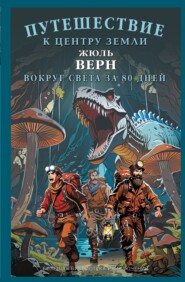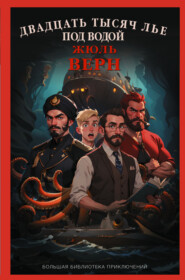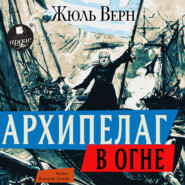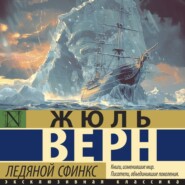По всем вопросам обращайтесь на: info@litportal.ru
(©) 2003-2024.
✖
Пятнадцатилетний капитан / Dick Sand. A Captain at Fifteen. Уровень 2
Настройки чтения
Размер шрифта
Высота строк
Поля
But Cousin Benedict took no interest in that.
“You cannot suppose,” he said to Captain Hull, after various repetitions of the trick, “that dogs are the only animals endowed with intelligence. Rats, you know, always leave a sinking ship, and beavers invariably raise their dams before the approach of a flood. And insects! Are not the structures of ants the very models for the architects of a city? And cannot fleas go through a drill and fire a gun as well as the artillerymen? This Dingo is not very interesting. Perhaps one day or other it may be identified as the ‘canis alphabeticus[16 - canis alphabeticus – собака-грамотей]’ of New Zealand.”
Anyway, Dingo was regarded as a phenomenon. This feeling was not shared by Negoro. He studiously avoided the animal, and Dick Sand was quite convinced that the cook’s hatred of the dog became still more intense.
This portion of the Pacific is almost always deserted. It is out of the line of the American and Australian steamers.
Sometimes white petrels congregated near the schooner; and sometimes petrels with brown borders on their wings came in sight.
On the day the wind shifted, Mrs. Weldon was walking up and down on the “Pilgrim’s” stern, when her attention was attracted by a strange phenomenon. Both Dick and Jack were standing close behind her, and she cried, -
“Look, Dick, look! The sea is all red. Is a seaweed making the water so strange?”
“No,” answered Dick, “it is not a weed; it is what the sailors call whales’ food. These are innumerable myriads of minute crustacea.”
“Crustacea,” replied Mrs. Weldon, “but they must be so small that they are mere insects. Cousin Benedict no doubt will like to see them.”
She called aloud, -
“Benedict! Benedict! Come here! We have here something interesting for you.”
The amateur naturalist slowly emerged from his cabin followed by Captain Hull.
“Ah! Yes, I see!” said the captain; “whales’ food; just the opportunity for you, Mr. Benedict, to study one of the most curious of the crustacea.”
“Nonsense!” ejaculated Benedict contemptuously; “utter nonsense!”
“Why? What do you mean, Mr. Benedict?” retorted the captain.
“Are you not aware, sir, that I am an entomologist?”
Captain Hull was unable to repress a smile, and turning to Mrs. Weldon, he continued, -
“When a whale gets into the middle of them it just opens its jaws, and, in a minute, hundreds of thousands of these minute creatures are inside the fringe or whalebone around its palate.”
Then they heard a shout from one of the sailors,”A whale!”
“There’s the whale!” repeated the captain. He hurried to the bow, followed by all the passengers. Even Cousin Benedict took a share in the general interest.
There was no doubt about the matter. An unusual commotion in the water showed the presence of a whale. Captain Hull and his crew gazed at the animal.
The captain’s eye soon enabled him to observe a column of water and vapour from the nostrils. “It isn’t a real whale,” he said; “the whale’s spout is small and rises high in the air. Dick, tell me, what do you think about it?”
With a critical eye Dick Sand looked long and steadily at the spout.
“I think it is a finback, sir,” said the apprentice, “But it is a very large finback.”
“Seventy feet, at least!” rejoined the captain.
“What a big fellow!” said Jack.
“Yes,” said the boatswain; “this one, if only we can get him, will fill our empty barrels.”
“Rather rough work, you know,” said Dick, “to attack a finback!”
“You are right, Dick,” answered the captain.
“But the profit is worth the risk, captain, isn’t it?”
“You are right again, Dick,” replied Captain Hull, and as he spoke, he clambered on to the bowsprit in order to get a better view of the whale.
The crew were as eager as their captain. They scanned the movements of their prey in the distance.
“Mamma!” cried little Jack, “I want to see a whale close, quite close, you know.”
“And so you will, my boy,” replied the captain, who was standing by. He turned to his crew,
“My men! What do you think? Remember, we are all alone; we have no whalemen to help us; we must rely upon ourselves. I can throw a harpoon; what do you say?”
The crew responded with a ringing cheer,
“Ay, ay, sir! Ay, ay!”
Chapter VII
Preparations for an Attack
Great was the excitement, and the question of an attempt to capture the sea-monster became the theme of conversation. The captain lost no time. He knew that the pursuit of a finback was always a matter of some peril.
The weather was excellent for the enterprise. The sea was calm, and the wind was moderate. The captain said,”Now, Dick, I am going to leave you for a few hours: while I am away, I hope that it will not be necessary for you to make any movement whatever. However, you must be on the watch. It is not very likely, but it is possible that this finback may carry us out to some distance. If so, you will follow us; and in that case, I am sure you may rely upon Tom and his friends for assistance.”
The negroes assured the captain of their willingness to obey Dick’s instructions, they were ready for immediate action.
The captain went on, “The weather is beautifully fine, Dick; but you must not leave the ship. If I want you to follow us, I will hoist a flag on the boat-hook.”
“You may trust me, sir,” answered Dick.
“All right, my lad; keep a cool head and a good heart. You are second captain now, you know!”
Dick blushed, and the bright flush spoke more than words.
“I can trust the lad,” murmured the captain to himself; “he is as modest as he is courageous.”
The captain was aware of the danger to which he was exposing himself, but his fisherman’s instinct was very keen. And so he finally prepared to start.
“I wish you all success!” said Mrs. Weldon.
“Many thanks!” he replied.
“You cannot suppose,” he said to Captain Hull, after various repetitions of the trick, “that dogs are the only animals endowed with intelligence. Rats, you know, always leave a sinking ship, and beavers invariably raise their dams before the approach of a flood. And insects! Are not the structures of ants the very models for the architects of a city? And cannot fleas go through a drill and fire a gun as well as the artillerymen? This Dingo is not very interesting. Perhaps one day or other it may be identified as the ‘canis alphabeticus[16 - canis alphabeticus – собака-грамотей]’ of New Zealand.”
Anyway, Dingo was regarded as a phenomenon. This feeling was not shared by Negoro. He studiously avoided the animal, and Dick Sand was quite convinced that the cook’s hatred of the dog became still more intense.
This portion of the Pacific is almost always deserted. It is out of the line of the American and Australian steamers.
Sometimes white petrels congregated near the schooner; and sometimes petrels with brown borders on their wings came in sight.
On the day the wind shifted, Mrs. Weldon was walking up and down on the “Pilgrim’s” stern, when her attention was attracted by a strange phenomenon. Both Dick and Jack were standing close behind her, and she cried, -
“Look, Dick, look! The sea is all red. Is a seaweed making the water so strange?”
“No,” answered Dick, “it is not a weed; it is what the sailors call whales’ food. These are innumerable myriads of minute crustacea.”
“Crustacea,” replied Mrs. Weldon, “but they must be so small that they are mere insects. Cousin Benedict no doubt will like to see them.”
She called aloud, -
“Benedict! Benedict! Come here! We have here something interesting for you.”
The amateur naturalist slowly emerged from his cabin followed by Captain Hull.
“Ah! Yes, I see!” said the captain; “whales’ food; just the opportunity for you, Mr. Benedict, to study one of the most curious of the crustacea.”
“Nonsense!” ejaculated Benedict contemptuously; “utter nonsense!”
“Why? What do you mean, Mr. Benedict?” retorted the captain.
“Are you not aware, sir, that I am an entomologist?”
Captain Hull was unable to repress a smile, and turning to Mrs. Weldon, he continued, -
“When a whale gets into the middle of them it just opens its jaws, and, in a minute, hundreds of thousands of these minute creatures are inside the fringe or whalebone around its palate.”
Then they heard a shout from one of the sailors,”A whale!”
“There’s the whale!” repeated the captain. He hurried to the bow, followed by all the passengers. Even Cousin Benedict took a share in the general interest.
There was no doubt about the matter. An unusual commotion in the water showed the presence of a whale. Captain Hull and his crew gazed at the animal.
The captain’s eye soon enabled him to observe a column of water and vapour from the nostrils. “It isn’t a real whale,” he said; “the whale’s spout is small and rises high in the air. Dick, tell me, what do you think about it?”
With a critical eye Dick Sand looked long and steadily at the spout.
“I think it is a finback, sir,” said the apprentice, “But it is a very large finback.”
“Seventy feet, at least!” rejoined the captain.
“What a big fellow!” said Jack.
“Yes,” said the boatswain; “this one, if only we can get him, will fill our empty barrels.”
“Rather rough work, you know,” said Dick, “to attack a finback!”
“You are right, Dick,” answered the captain.
“But the profit is worth the risk, captain, isn’t it?”
“You are right again, Dick,” replied Captain Hull, and as he spoke, he clambered on to the bowsprit in order to get a better view of the whale.
The crew were as eager as their captain. They scanned the movements of their prey in the distance.
“Mamma!” cried little Jack, “I want to see a whale close, quite close, you know.”
“And so you will, my boy,” replied the captain, who was standing by. He turned to his crew,
“My men! What do you think? Remember, we are all alone; we have no whalemen to help us; we must rely upon ourselves. I can throw a harpoon; what do you say?”
The crew responded with a ringing cheer,
“Ay, ay, sir! Ay, ay!”
Chapter VII
Preparations for an Attack
Great was the excitement, and the question of an attempt to capture the sea-monster became the theme of conversation. The captain lost no time. He knew that the pursuit of a finback was always a matter of some peril.
The weather was excellent for the enterprise. The sea was calm, and the wind was moderate. The captain said,”Now, Dick, I am going to leave you for a few hours: while I am away, I hope that it will not be necessary for you to make any movement whatever. However, you must be on the watch. It is not very likely, but it is possible that this finback may carry us out to some distance. If so, you will follow us; and in that case, I am sure you may rely upon Tom and his friends for assistance.”
The negroes assured the captain of their willingness to obey Dick’s instructions, they were ready for immediate action.
The captain went on, “The weather is beautifully fine, Dick; but you must not leave the ship. If I want you to follow us, I will hoist a flag on the boat-hook.”
“You may trust me, sir,” answered Dick.
“All right, my lad; keep a cool head and a good heart. You are second captain now, you know!”
Dick blushed, and the bright flush spoke more than words.
“I can trust the lad,” murmured the captain to himself; “he is as modest as he is courageous.”
The captain was aware of the danger to which he was exposing himself, but his fisherman’s instinct was very keen. And so he finally prepared to start.
“I wish you all success!” said Mrs. Weldon.
“Many thanks!” he replied.

















